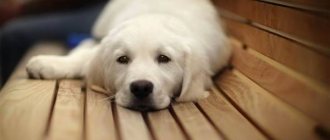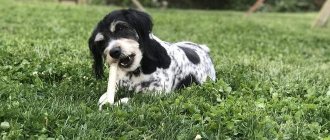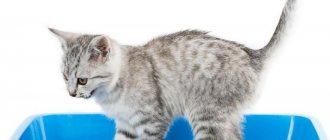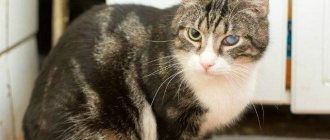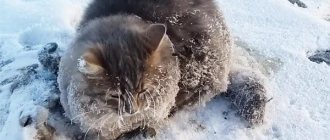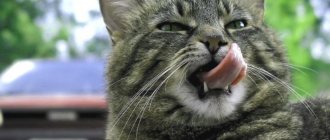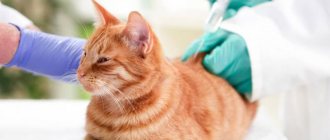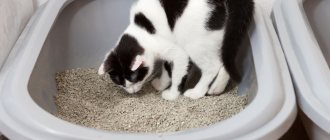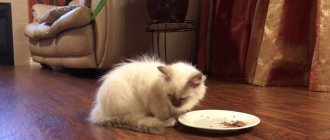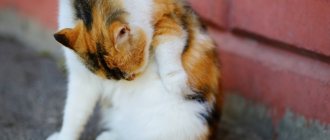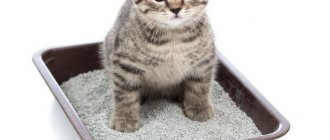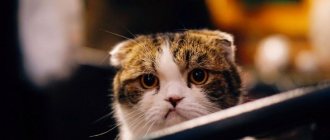Hiccups in cats are a symptom of uncontrolled spasms of the diaphragm (the muscle that separates the chest area from the abdominal area). Its convulsive contraction causes forced breathing in the animal. During inhalation, a reflex closure of the glottis occurs and the airways are blocked by the epiglottis (subpharyngeal cartilage), which is accompanied by a characteristic sound. In fact, hiccups are short-term suffocation. The reasons for this phenomenon may be different. And, depending on them, diaphragm spasm can be either a normal physiological phenomenon or a pathology. From this article you will learn about why this happens, how dangerous it is, what to do so that the attacks stop and do not return.
Why does a kitten hiccup: causes and methods of elimination
Many owners worry if their kitten hiccups. Hiccups after eating are quite typical, but they can also be a symptom of an illness. Natural and unhealthy hiccups - what's the difference? Let's look at the reasons and consider methods for eliminating hiccups in kittens.
Causes of hiccups in kittens
Hiccups are a natural and involuntary process that cannot be controlled by will or desire.
Good to know! Hiccups are a malfunction of the respiratory system caused by improper, involuntary contractions of the diaphragm.
During contraction of the diaphragm, the kitten's epiglottis closes, resulting in the characteristic sound of hiccups.
Causes of hiccups:
- Rapid absorption of water and food.
- Overeating is a strong distension of the stomach.
- Accumulation of hair in the stomach.
- Allergy.
- Moments of high activity.
- Stress and extreme excitement.
- A metabolic disorder that can lead to behavioral changes, including hyperactivity.
- Freezing.
If your pet hiccups regularly after eating, carefully observe the feeding process. The kitten should not grab food in chunks or swallow it without chewing.
You've probably experienced debilitating hiccups yourself and know how much discomfort this involuntary phenomenon can bring. Natural and unhealthy hiccups - what's the difference? It is difficult to answer this question, since hiccups are not a defense mechanism; rather, it is a reaction of the nervous system that cannot be controlled.
Natural hiccups occur and go away without intervention. If a kitten begins to hiccup after eating, the condition usually returns to normal after burping. If the pet hiccups frequently and for a long time, the owner needs to take care of eliminating the provoking factors and monitor the dynamics of the development of the clinical picture:
- Regularly prevent the accumulation of hair in the stomach - this point is especially important for long-haired young cats. The pet washes itself 2-3 times a day; in the process, it regularly swallows hair, which accumulates in the stomach, forming a lump. To prevent hair accumulation, various means are used: pastes, gels, catnip, etc.
- Change the type of feeding and eliminate allergens from food - if the kitten hiccups frequently, for a long time and clearly suffers from this, pay attention to the condition of the mucous membranes. Typically, prolonged, debilitating hiccups are associated with irritation of the mucous membranes, which may be indicated by sneezing, excessive production of tears, and unhealthy shine in the eyes.
- Monitor the temperature in your home - kittens are very sensitive to cold, so hiccups due to freezing are a natural mechanism for mobilizing the body's strength. If for some reason the kitten has spent a long time in the cold and often hiccups, most likely he has already caught a cold, and the hiccups are associated with improper functioning of thermoregulation.
- Distension of the stomach due to extensive helminthic infestation - according to generally accepted rules, animals must be treated for fleas and worms once every 3-4 months. Kittens under 1–2 months of age are not treated for worms or special, gentle products are chosen. A bloated abdomen, diarrhea, slow weight gain, constipation, vomiting, intoxication, and anemia may indicate helminthic infestation.
Note! In rare cases, hiccups may indicate a neurological disorder, but such a diagnosis is made by “method of exclusion” - only after all other causes have been excluded.
Hiccups after eating
Hiccups after eating are a natural reaction of the body. There are three main reasons:
- Distension of the stomach.
- Swallowing air.
- Stress from competition.
Make sure that the kitten eats and drinks at a normal rate - if necessary, if the kitten eats dry food, you can purchase a special bowl with a structured bottom and high sides. Competition can affect the rate at which food and water are consumed, so make sure your kitten is comfortable while feeding.
Experience shows that newborn kittens are more likely to develop hiccups. The causes of hiccups in newborn kittens are natural. While the kitten is sucking milk, it may swallow air, for example, if it lies in an uncomfortable position or the mother cat has too little milk . Usually, hiccups in newborn kittens are eliminated by licking by the mother.
When artificial feeding, it is extremely important that the kitten sucks milk itself. Squeezing milk into the baby's mouth can lead not only to hiccups, but also to food getting into the respiratory tract. Milk that gets into the lungs causes bacterial pneumonia, which can lead to death.
Note! If the kitten is bottle-fed and often hiccups after eating, try giving it a light massage, holding it with its head up, stroking its belly and back so that the baby can burp.
Hiccups can also be observed when switching from milk to supplementary feeding. In this case, the body’s reaction is considered natural, since it adapts to digesting food of an unusual structure. According to generally accepted recommendations, supplementary food that can be licked is more suitable for kittens under 1.5–2 months of age.
Methods for eliminating hiccups in kittens
“Traditional” methods for eliminating hiccups in kittens: drinking too much, frightening, taking certain positions, physical activity are not suitable, since they create even more stress by forcing the pet to do something it does not want. If the kitten starts hiccupping, just watch him.
The most reliable and safe method for eliminating hiccups is to pick up the kitten and stroke it until it falls asleep.
If the process has exhausted your pet, contact your veterinarian; most often, the problem can be solved with minimal doses of antispasmodics.
Source: https://zveridoma.ru/pochemu-kotenok-ikaet-prichiny-i-metody-ustraneniya/
Natural and unhealthy hiccups - what's the difference?
There are natural and unhealthy hiccups - what's the difference between them? The causes of “healthy” hiccups have already been listed above, and therefore it is time to list the factors leading to the development of pathological hiccups:
- Hiccups often develop in animals suffering from neurological diseases. It happens, for example, that a kitten with encephalitis is additionally shaken by attacks of hiccups.
- Serious intoxication, including helminthic nature. In addition, pets suffering from kidney disease (the latter also lead to intoxication) sometimes suffer from hiccups.
- Increased intracranial pressure.
- Diseases of the gastrointestinal tract. For example, with gastritis, the vagus nerve can be constantly irritated, causing the kitten to suffer from chronic, incessant hiccups.
Cat hiccups - reasons and what to do
Hiccups in cats, like in humans, are a sharp contraction of the diaphragm and are a breathing disorder. Pathology can occur for various reasons. In this case, hiccups have different durations. Most often this is a short-term phenomenon and goes away on its own. But to make sure that the animal’s health is not in danger, you need to know why the cat hiccups.
Why does the animal hiccup?
Hiccups in cats can occur at any age. Sometimes an animal begins to hiccup while still in the womb. However, this phenomenon is considered physiologically necessary, since it allows you to train the diaphragm and prepares the kitten for independent breathing.
© shutterstock
Prolonged hiccups indicate serious health problems. But in adults, in most cases, the pathology is harmless. It occurs in cats as a reaction to discomfort in the stomach or intestines. And after the work of the gastrointestinal tract is normalized, the cat no longer hiccups.
There are several types of hiccups in cats:
- Idiopathic;
- Psychogenic;
- Physiological. Occurs due to stimulation of the vagus nerve or diaphragm;
- Pathological.
Each type of hiccups can occur due to several reasons.
Idiopathic
The phenomenon is short-term and does not pose a threat to the health of the animal. The true reasons why cats and kittens develop such hiccups are unknown. However, the idiopathic type of pathology is classified as natural, unextinguished infant reflexes that persist in adults. The phenomenon often occurs in kittens in the womb.
The pathology occurs spontaneously, and the cat hiccups without any reason. But after just a couple of minutes the phenomenon stops.
Psychogenic
The cat hiccups due to stress. This can be facilitated :
- Prolonged lack of attention from a person;
- Undeserved punishment;
- Fright;
- Frequent stay in a confined space without owners;
- Fighting for territory or food. This reason is relevant if several cats live together.
The addition of a new pet to your home can also cause your cat to hiccup. However, psychogenic hiccups do not last long. Spasms of the diaphragm occur with a frequency of no more than 2-3 times per minute, gradually fading away. In this case, the phenomenon goes away much faster if the owner pays attention to the animal and tries to gently calm it down.
© shutterstock
Physiological
With this type of pathology, the cat hiccups after eating. This occurs as a result of the body's attempts to restore the functioning of the vagus nerve. This nerve process is paired and permeates the entire body of the animal.
It is he who supplies nerve impulses from the cat’s brain to all its organs and limbs. And the part of the vagus nerve that passes through the diaphragm regulates the functions of breathing, heartbeat, swallowing and stomach function.
He is also responsible for reactions such as vomiting.
If the vagus nerve is pinched, the body, through a sharp contraction of the diaphragm, tries to release the process. And the pathology that causes a cat to hiccup can occur in the following cases :
- Binge eating;
- Haste while eating, as a result of which the animal swallows pieces of food without chewing them. Often this situation occurs if the cat has been hungry for a long time or there is competition for food in the house;
- Drinking cold water or food;
- Lack of fluid in the power system. It often occurs when an animal is fed exclusively dry food and the cat does not have the opportunity to drink it;
- Ingestion of large amounts of fur. This usually happens during the animal’s molt;
- Eating in an unnatural position in which the cat has to stand. In this case, the stomach and esophagus become bent, and food comes in uneven portions and with a lot of air. This is possible if the dishes for feeding the cat are located on a stand;
- Hypothermia, as a result of which the cat begins to tremble.
Also, a cat often hiccups during pregnancy. This happens because her stomach and diaphragm are displaced under the pressure of the enlarged uterus.
As a result of physiological reasons, the cat often hiccups. But usually after 4-7 minutes the phenomenon subsides.
The only cause for serious concern for physiological pathology is a condition in which the cat hiccups due to food stuck in the mouth or esophagus. In this case, the animal experiences coughing, lacrimation, increased anxiety and nausea with gagging sounds. In this case, it is necessary to urgently help the cat yourself, or take the pet to the veterinarian.
© shutterstock
Pathological
The true causes of hiccups in a cat can only be determined by a veterinarian after a comprehensive examination of the animal. However, pathological hiccups are always provoked by a serious illness. The phenomenon is characterized by a long duration; spasms may be infrequent, but last more than 7-10 minutes. At the same time, owners may notice strange behavior of the animal.
If a cat hiccups for a long time, the following accompanying symptoms are serious reasons for concern::
- The animal staggers or walks in circles. The cat begins to see poorly, feels bouts of nausea, which sometimes turn into vomiting. Such signs indicate encephalitis, meningitis, a brain tumor, or high pressure in the pet’s skull.
- Disorder of urination, along with frequent and prolonged hiccups, occurs due to pathology of the gallbladder or bladder, as well as gastritis and peptic ulcers.
- Hissing breathing and shortness of breath may well signal pneumonia, bronchitis, or problems with the heart and circulatory system. If loss of consciousness is added to such signs, then there is a high probability of a stroke, arrhythmia or heart attack in the animal.
- With the main symptoms being nausea and vomiting, hiccups are often caused by parasites. A viral or bacterial infection cannot be ruled out. In this case, sneezing or coughing is added to the main symptoms.
© shutterstock
In rare cases, a cat hiccups due to an allergy. In this case, the phenomenon is accompanied by lacrimation and coughing.
Treatment
If the cat hiccups, but the phenomenon is not accompanied by other unusual symptoms, treatment of the animal consists of such measures:
- The pet should be caressed and calmed down;
- Offer your cat to drink water at room temperature;
- Distract the animal by keeping it busy with play.
If a cat hiccups because it is cold and trembles, it must be warmed up. But treatment in the case of pathological hiccups should only be prescribed by a veterinarian.
PreviousNext
Source: https://KOTiKo.ru/vopros-otvet/koshka-ikaet-prichiny-i-chto-delat.html
Causes
Both adults and babies can suffer from hiccups. Often a kitten experiences it in the womb, shortly before birth. It is believed that intrauterine hiccups are necessary for the formation of independent breathing and serve to train the diaphragm and respiratory muscles.
In most cases, hiccups for adults are completely harmless. In this case, it is usually episodic in nature and is an unconditioned reflex that occurs as a response to temporary discomfort in the gastrointestinal tract. After the normal state of the gastrointestinal tract is restored, spasms of the diaphragm also disappear.
The cat hiccups: reasons, what to do, why the cat hiccups after eating
Hiccups are a nonspecific disorder of external respiration.
It occurs as a result of mechanical irritation of the vagus nerve (passes through the chest and diaphragm to the stomach and abdominal organs, connects internal organs with the central nervous system) and reflex contraction of the diaphragm. In this case, each breath is interrupted by the sudden closing of the gap, resulting in a characteristic strangled sound.
A cat's attack may occur suddenly, for no apparent reason. It all goes away as involuntarily as it began.
In healthy adult cats, hiccups are a reaction to discomfort in the stomach or intestines and are harmless and short-term in nature. Does not pose a threat to health. Kittens begin to hiccup in the womb.
This phenomenon is considered physiologically necessary for the development of babies’ lungs, training the diaphragm, and preparing for independent breathing.
Kittens often hiccup due to hypothermia, since their thermoregulation is not well developed. Why do cats that are pregnant with kittens hiccup? An enlarged uterus causes a displacement of the diaphragm and stomach, which causes periodic irritation of the vagus nerve, so the cat begins to have an attack.
Psychogenic hiccups
Sometimes a cat's hiccups are psychosomatic in nature.
Psychogenic hiccups can be caused by:
- changing their usual living environment (the cats gradually get used to the new conditions, calm down, and the hiccups go away);
- severe fear;
- stress associated with the owner’s departure or a change in attitude towards the pet;
- stress caused by the presence of large strangers in the house;
- being in a confined space, alone;
- the arrival of a new pet.
A psychogenic attack does not last long. Spasms of the diaphragm, occurring at a frequency of 2-3 times per minute, gradually fade away. If the owner pays more attention to his beloved cat and gently calms him down, everything will go much faster.
Kitten hiccups after eating
Why do cats hiccup after eating? Physiological hiccups occur due to excessive stress on the stomach due to food swallowed in large pieces, overeating, and insufficient water. Haste while eating is harmful.
It’s bad when a cat is hungry for a long time or when other animals are in charge of the house and are used to competing for food. It is dangerous if a piece of food gets stuck in the throat or esophagus.
If, after eating, a cat hiccups, wheezes while breathing, or experiences increased anxiety, emergency veterinary attention is needed.
There should always be a bowl of clean, cool water in front of the cat. This is especially important if you feed your pet dry food. Food should be given often, but in small portions. The cat's stomach does not digest cold or too hot food well. Food should be warm or at room temperature. Meat and vegetables - soft, chopped as small as possible.
It’s bad if the feeding utensils are positioned incorrectly. The poor cat is in an unnatural position. The esophagus and stomach are bent. Food arrives unevenly, with a lot of air. While eating, the cat should not be nervous or distracted by extraneous factors. If your pets cannot easily share food, feed them all separately at different times.
How to help a cat
A hiccupping cat gets nervous, begins to rush around the house, and suddenly changes its position. To help quickly cope with the attack, she needs to be calmed down. Play with your favorite pet and cuddle it. Offer a new toy. Play is always a good option, especially for a small kitten. A sudden change in activity with a change in breathing rhythm helps eliminate the problem.
Try giving your cat clean, lukewarm water. But you can’t scare people, as people are advised to do (when frightened, a hiccupping person takes a frantic breath of air and soon everything goes away).
On the contrary, try to provide him with complete peace. On the contrary, try to provide him with complete peace. Show affectionate care. The pet will be distracted and calm down. Breathing will return to normal.
This will help you overcome hiccups faster.
Hairballs that get into your cat's gastrointestinal tract and interfere with normal digestion can also irritate the vagus nerve and cause hiccups. This problem is especially relevant during molting. When a cat sheds, the owner should comb the fur especially diligently and carefully.
Pathological hiccups
If your cat does not stop hiccupping during the day, experiences severe discomfort, and spasms last 7-10 minutes, you should be wary.
Prolonged hiccups are the first symptom of a serious illness, and the range of possible pathologies is extensive, from pneumonia and problems with the cardiovascular system, to encephalitis and parasitic infestation.
It happens that a cat suffers from allergies that affect the mucous membrane of the respiratory tract. Allergic hiccups are accompanied by lacrimation, difficulty breathing, frequent sneezing, and coughing.
Signs of concern:
- lack of coordination of movement, the cat staggers, walks in circles;
- anxiety, irritability, lethargy, change in habitual behavior, refusal to eat a favorite treat;
- hiccups are accompanied by nausea and bouts of vomiting;
- the cat wheezes and breathes heavily;
- The cat has urinary incontinence and there is blood in the stool.
For debilitating hiccups, contact your veterinarian. And as soon as possible. Do not self-medicate. Don't waste precious time. Only a veterinarian, after a comprehensive examination, will determine the cause of the pathology and prescribe treatment.
Source: https://koshek.ru/pochemu-koshka-ikaet.html
How to help a cat
A hiccupping cat gets nervous, begins to rush around the house, and suddenly changes its position. To help quickly cope with the attack, she needs to be calmed down. Play with your favorite pet and cuddle it. Offer a new toy. Play is always a good option, especially for a small kitten. A sudden change in activity with a change in breathing rhythm helps eliminate the problem.
Try giving your cat clean, lukewarm water. But you can’t scare people, as people are advised to do (when frightened, a hiccupping person takes a frantic breath of air and soon everything goes away). On the contrary, try to provide him with complete peace. On the contrary, try to provide him with complete peace. Show affectionate care. The pet will be distracted and calm down. Breathing will return to normal. This will help you overcome hiccups faster.
Why does a cat hiccup and what should the owner do?
Hiccups in cats are a symptom of uncontrolled spasms of the diaphragm (the muscle that separates the chest area from the abdominal area). Its convulsive contraction causes forced breathing in the animal. On inhalation, a reflexive closure of the slit occurs and the airways are blocked by the epiglottis (subpharyngeal cartilage), which is accompanied by a characteristic sound.
In fact, hiccups are short-term suffocation. The reasons for this phenomenon may be different. And, depending on them, diaphragm spasm can be either a normal physiological phenomenon or a pathology. From this article you will learn about why this happens, how dangerous it is, what to do so that the attacks stop and do not return.
Causes
Both adults and babies can suffer from hiccups. Often a kitten experiences it in the womb, shortly before birth. It is believed that intrauterine hiccups are necessary for the formation of independent breathing and serve to train the diaphragm and respiratory muscles.
In most cases, hiccups for adults are completely harmless. In this case, it is usually episodic in nature and is an unconditioned reflex that occurs as a response to temporary discomfort in the gastrointestinal tract. After the normal state of the gastrointestinal tract is restored, spasms of the diaphragm also disappear.
But if a cat hiccups frequently and for a long time, this may indicate severe internal pathologies. Thus, depending on the causes and provoking factors, several types of hiccups are distinguished:
- idiopathic;
- psychogenic;
- arising as a result of stimulation of the diaphragm and irritation of the vagus nerve;
- pathological
Idiopathic hiccups
It has no apparent cause and goes away on its own. Doctors suggest that initially hiccups were a protective reaction of the body. Idiopathic hiccups are an incompletely extinguished reflex of intrauterine fetal hiccups, necessary for the kitten to learn to breathe on its own.
Hiccups caused by stimulation of the diaphragm and irritation of the vagus nerve
If a cat hiccups after eating, this means that its body is trying to restore the function of the pinched vagus nerve.
The vagus nerve or vagus nerve is a paired nerve that runs throughout the body, from the head to the abdominal cavity. It innervates the head, neck, organs of the chest cavity, and gastrointestinal tract.
Passing through the hole in the diaphragm, it regulates the functions of breathing, swallowing, heartbeat, vomiting, and stomach function.
Under the influence of many factors and as a result of stimulation of the diaphragm, the vagal nerve can be infringed. The mechanism of hiccups, which consists of a sharp contraction of the diaphragmatic muscles and subsequent release of tension, helps relieve the pinching and release it. Situations that contribute to nerve pinching lead to the appearance of hiccups:
- binge eating;
- hasty eating, poor chewing, swallowing food in large pieces;
- eating cold food or water;
- eating dry food in the absence of sufficient liquid;
- severe hypothermia of the animal;
- eating in an awkward position when the esophagus or stomach is bent;
- pregnancy, when an enlarged uterus can put pressure on the diaphragm;
- The molting period is also a provoking factor, since cats, while licking themselves, swallow a large amount of hair.
Treatment and prevention of hiccups
If hiccups are episodic and not a symptom of serious illness, then treatment will not be required. To quickly stop the attack, you can use distracting measures:
- calm the pet, caress it;
- give the animal water to drink;
- keep yourself busy with an interesting game;
- warm if the cat is hypothermic.
If your pet begins to hiccup after eating, it is recommended to pay attention to the following points:
- cat food and water should only be at room temperature;
- The animal should be fed only crushed food;
- the cat should always have free access to clean water;
- meals should take place in a friendly, calm environment;
- the animal should not be overfed;
- a cat, and especially a kitten, should not be allowed to become hypothermic;
In addition, you should promptly comb out a cat that sheds, especially if it is a long-haired breed.
If the hiccups are prolonged and accompanied by other suspicious symptoms, it is necessary to urgently take the cat to a veterinary clinic to exclude serious pathologies.
If the disease is diagnosed, the doctor will prescribe a course of treatment. Once the animal begins to feel better, hiccups can also be easily dealt with since the cause has been eliminated.
Source: https://VeterinarGid.ru/cats/vet/koshka-ikaet.html
Causes of hiccups in newborn kittens
The causes of hiccups in newborn kittens most often fall into the category of physiological and not dangerous. It's all about the physiology of young pets:
- The lungs of newborn kittens do not expand immediately; sometimes this process takes up to three days (atelectasis of newborns).
- Sometimes this process is “slow,” and therefore hiccups develop as an auxiliary mechanism. With strong contractions of the diaphragm, the lungs are “churned” and filled with air much faster.
The cat hiccups: why this happens and how to get rid of hiccups
Meeting a hiccupping cat is very rare, since this phenomenon is not very common for our four-legged pets. In addition, it can easily be confused with attempts to cough up fur or gagging.
Attacks of hiccups can be completely painless for the cat and pass without a trace, or they can be accompanied by other alarming symptoms, which are important to pay attention to in time.
Why a cat hiccups and how to help him get rid of a tiring attack will be discussed below.
The cat hiccups
A little physiology
Hiccups, both human and feline, are a rather mysterious phenomenon. It is known that attacks of hiccups are usually associated with mechanical irritation of the vagus nerve. Passing through the chest, diaphragm and peritoneum, this nerve is closely adjacent to the esophagus.
Bouts of hiccups occur in animals that chew their food poorly.
Once a cat has a bad experience with food or swallows too large a piece, the consequences will not be long in coming. The pulsating activity of this nerve will be the result of such a physiological phenomenon as hiccups. Contractions of the nerve will be attempts to get rid of the load that the animal brought by eating too large a piece.
To relieve pressure from the vagus nerve, you must do one of the following:
- Stretch.
- Inhale and hold your breath. With the help of inhalation, the animal straightens the diaphragm, pushing it down.
- Drink some water.
Unfortunately, sometimes water does not soothe, but provokes hiccups
The animal can perform all these actions independently if it wishes. The owner's support and care are not required in this matter.
Types of hiccups
It would seem that such a phenomenon as hiccups should have an exclusively physiological nature, but even here everything is not so simple. Hiccups can also contain an element of psychosomatization and be a reaction to a change in relationship with the owner. Sometimes the causes of hiccups remain unknown due to its fleeting nature.
Table 1. Types of hiccups
VarietyDescription
| Idiopathic | Idiopathic hiccups are a kind of infantile inheritance, sometimes making themselves felt in adulthood. It cannot be predicted, and it leaves as suddenly as it comes. This type of hiccup is not accompanied by other painful manifestations and subsides within a few minutes after the onset. |
| Psychogenic | Hiccups caused by mental conditions are most often associated with a change in the usual environment, severe fear of the animal or prolonged stress. Also, attacks of hiccups can affect animals that have to fight for food resources in the house. To get rid of such hiccups, you should identify the source of the cat’s psychological discomfort. |
| Physiological | The pressure exerted on the vagus nerve by improper food intake also leads to prolonged bouts of hiccups. Excessive haste while eating, uncomfortable posture that distorts the esophagus, lack of water - all this sooner or later leads to painful hiccups. In addition to food, hairballs that get stuck in the gastrointestinal tract and interfere with normal digestion of food can also irritate the vagus nerve. |
| Pathological | Hiccups are sometimes the first innocent sign of serious illness. Its distinctive feature is its duration - the animal does not stop searching for ten minutes or more, experiencing discomfort. Only a veterinarian can determine the disease that causes hiccups, since the range of possible pathologies is quite large. It includes diseases from encephalitis to parasitic infestation |
Intrauterine hiccups
The phenomenon of intrauterine hiccups requires special consideration. For the first time, kittens encounter it, respectively, in the womb.
Before birth, hiccups perform a critical function - it allows kittens to use the diaphragm and make their first attempts to “breathe.”
Of course, at this moment the kittens are not yet capable of independent breathing, but such hiccups already signal that even if born prematurely, the cubs will be able to survive.
Kittens are first introduced to hiccups while still in the womb.
A cat also feels the “hiccups” of her cubs, since they appear quite late and represent fetal twitching, visible even to the naked eye. Lung expansion is an important milestone that unborn kittens pass through and marks their readiness to live independently.
Causes of hiccups and ways to combat them
Understanding the causes of hiccups, we will take the above brief classification as a basis and expand on it in more detail.
Physiological hiccups
As already mentioned, physiological hiccups are associated with gross violations of the rules of eating. To rid your pet of this type of hiccups, you need to monitor his diet and, if necessary, adjust it. Cats that are predisposed to physiological hiccups are:
- Consume too much food.
The owner must take responsibility for the portions, since he is the one responsible for the provisions. You should develop a feeding plan for your cat and avoid giving her food when her bowl is empty. Animals eat any food, and if the bowl is always full, then the feeding does not end at all. Frequent overeating increases the likelihood of hiccups - Eats food too quickly.
Despite the fact that cats are not characterized by excessive speed and sharpness, some cats may have the habit of instantly emptying their bowl. This is usually due to the specific living conditions of the animal. So, cats, whose food may be taken away by stronger comrades, try to eat it quickly so that they can get more. Accelerated eating provokes not only hiccups, but also digestive disorders - Lack of water.
Hiccups are one of the most harmless symptoms that appear in response to a lack of fluid in the body. In addition to hiccups, a cat that doesn’t drink enough will certainly someday encounter digestive disorders or prolonged constipation. In particular, owners whose animals are fed dry food should monitor the amount of food consumed. Food, especially dry food, should be washed down with plenty of water. - Uncomfortable posture while eating.
It seems that all cats eat in the same position, which does not cause them any difficulty, but it is not so simple. If the bowl is too high or too low for your pet, reaching for it will twist his esophagus, which will result in irritation of the vagus nerve. The bowl must match the size of the animal. A curved spine and arched back make it difficult to digest food - Hair getting stuck in the esophagus. The relevance of this reason increases during the molting period, when the animal literally does not have time to lick off all the hair that falls out. To avoid clogging the gastrointestinal tract with wool balls, it is recommended to comb your pets with brushes or furminators.
Hiccups are common in pregnant cats. Due to the enlargement of the uterus, the stomach and diaphragm are displaced, which also leads to periodic irritation of the vagus nerve.
In addition to the individual characteristics of digestion, there are general nuances that are characteristic of the gastrointestinal tract of all cats. For owners whose pets often experience hiccups, it is advisable to learn more about the properties of cat digestion and develop a diet based on the knowledge gained. Basic information about the functioning of the gastrointestinal tract of four-legged pets is presented below.
Features of cat digestion
Intrauterine hiccups
The phenomenon of intrauterine hiccups requires special consideration. For the first time, kittens encounter it, respectively, in the womb. Before birth, hiccups perform a critical function - it allows kittens to use the diaphragm and make their first attempts to “breathe.” Of course, at this moment the kittens are not yet capable of independent breathing, but such hiccups already signal that even if born prematurely, the cubs will be able to survive.
Kittens are first introduced to hiccups while still in the womb.
A cat also feels the “hiccups” of her cubs, since they appear quite late and represent fetal twitching, visible even to the naked eye. Lung expansion is an important milestone that unborn kittens pass through and marks their readiness to live independently.
